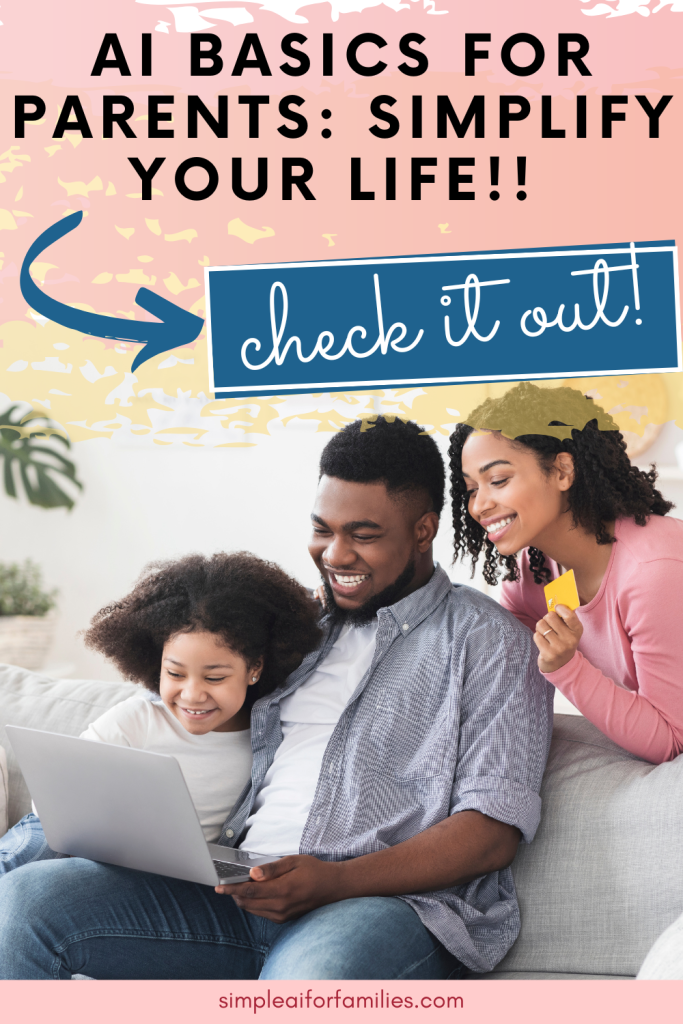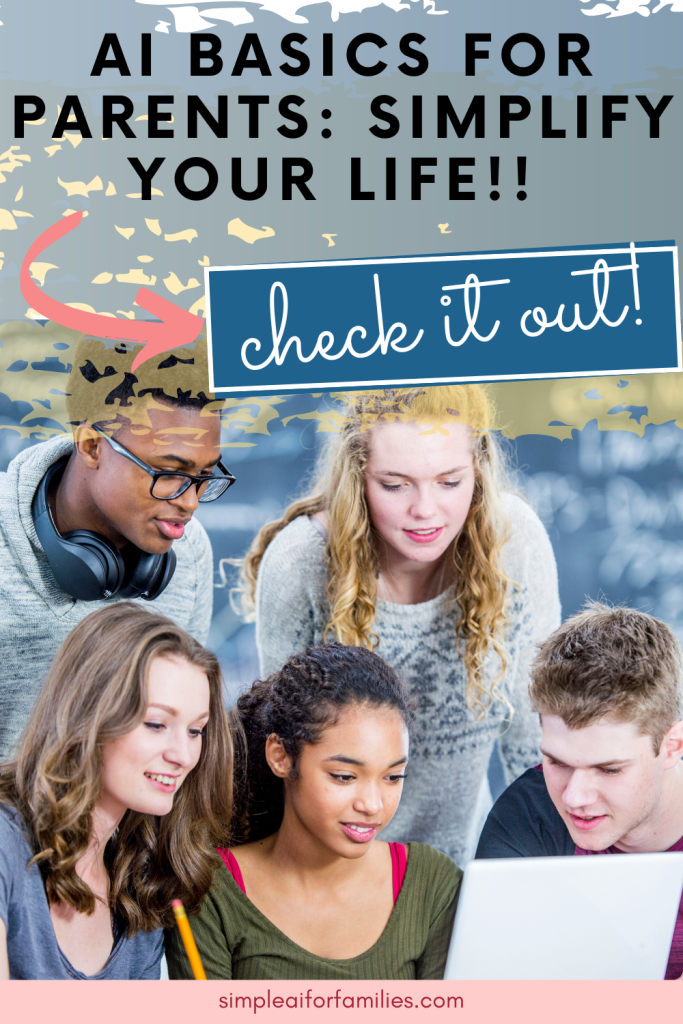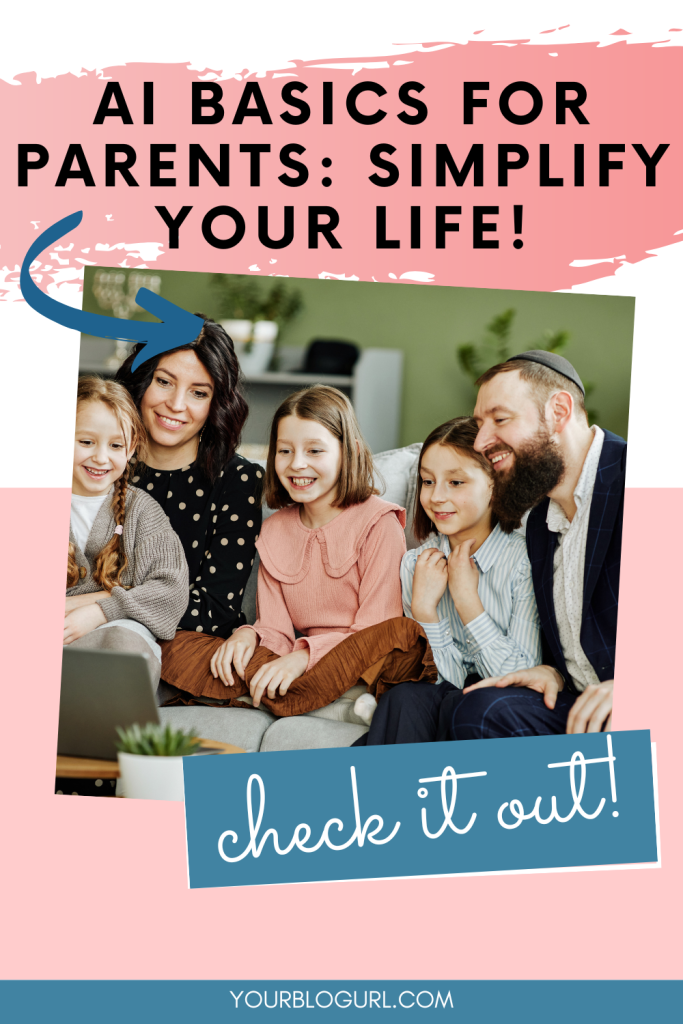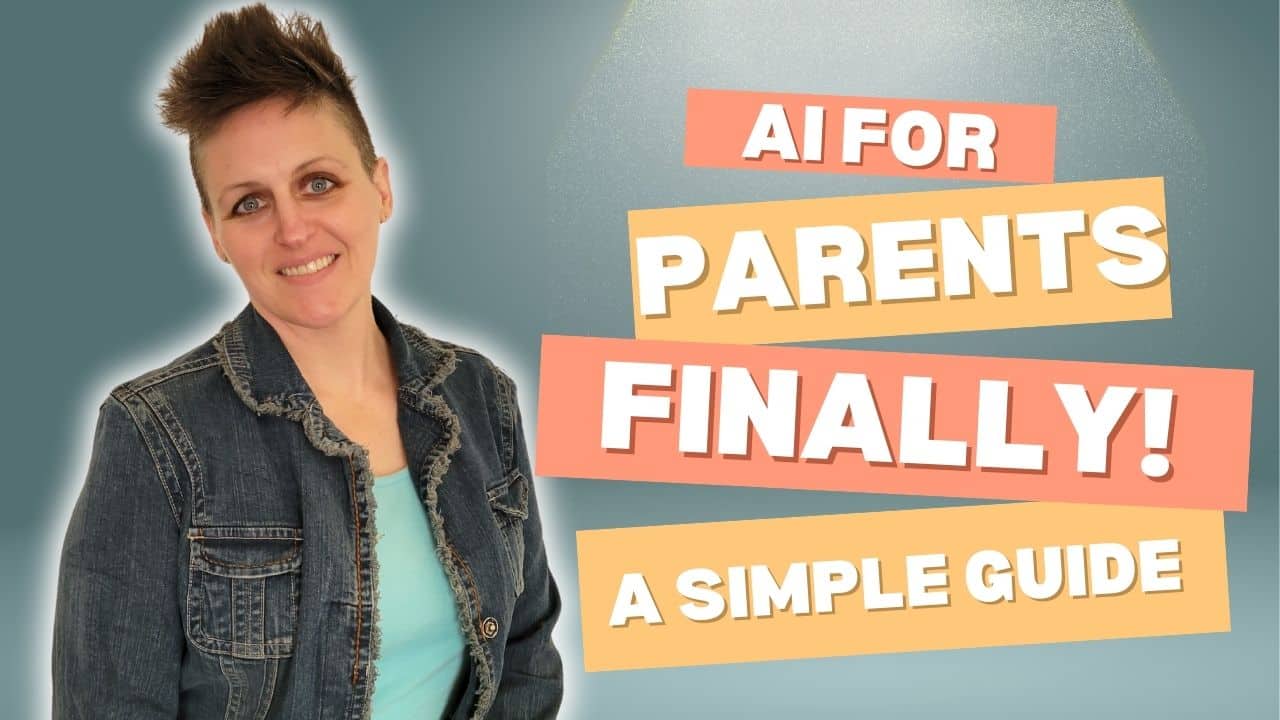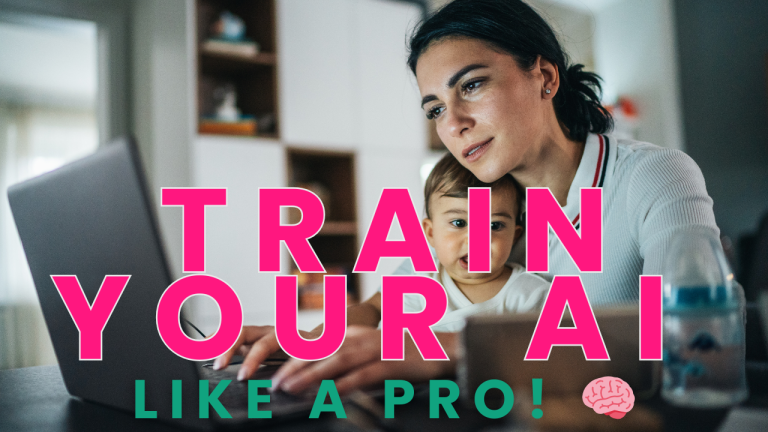AI Basics for Parents: Simplify Your Life with Artificial Intelligence
Feeling overwhelmed by the constant demands of family life, work, and errands? You’re not alone! Artificial intelligence (AI) might seem like a complicated topic best left to tech experts, but it’s actually much simpler than you think. It can be a powerful tool to streamline your daily routines. Bonnie, a busy mom of six, uses specific AI tools to manage homeschooling, work from home, run multiple businesses, author books and blogs, and participate in church activities. Let’s explore how AI can make your life easier at home, at work, and on the go.
What Exactly Is Artificial Intelligence?
So, what is AI anyway? In simple terms, AI is when computers or machines are designed to think, learn, and make decisions on their own. Think of it as giving a machine the ability to think a little like a human. AI can help with all sorts of things, from answering questions and solving problems to even making suggestions. It does this by using data and patterns to learn over time.
But remember, AI is only as good as the data it’s trained on. For example, if you ask an AI for dinner suggestions without providing any context, it won’t know about your dietary restrictions or preferences. It’s like asking a child what they want for dinner; they’ll probably just say tacos every time! You need to “train” your AI assistant by giving it specific information.
Think of it this way: when you ask Alexa to play your favorite song, that’s AI at work. Alexa uses AI to understand your request and respond instantly with the perfect tune. Pretty cool, right?
Meet Your New Assistants: ChatGPT and Claude
Now, let’s talk about some specific AI tools that can help you in your daily life: ChatGPT and Claude. These are like having personal assistants that can help with a variety of tasks. Let’s dive into each of these AI tools to see what they’re all about.

ChatGPT: Your Personal Assistant That Never Sleeps
ChatGPT is one of the most popular AI tools available. It’s like having a personal assistant in your phone or computer that never sleeps. You can ask it questions, get advice, or even use it to write emails or plan your day.
There’s a free option that’s very versatile, and a paid version that offers even more features. Many find the paid version helpful when incorporating the tool into many aspects of their lives.
One unique way to use ChatGPT is as a personal consultant or sounding board. While it’s not a replacement for professional therapy, ChatGPT can offer a convenient and cost-effective way to work through your thoughts and feelings. You can have discussions with it at any time, without having to worry about scheduling or judgment. Remember, this isn’t a replacement for professional help, but it can be a valuable tool for self-reflection.
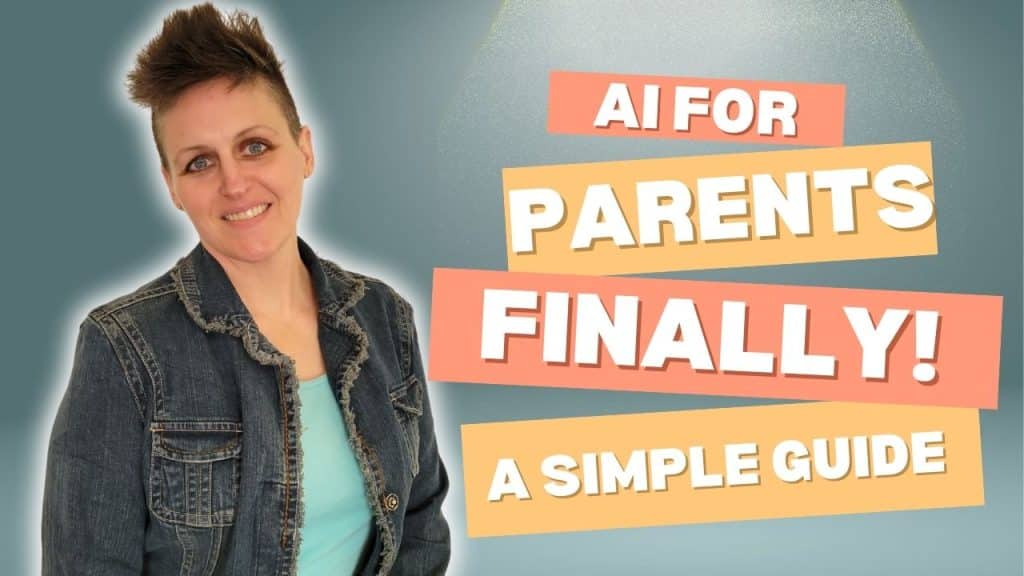
Claude: Your Go-To for Writing and Summarizing
Claude is another helpful AI tool that’s great for tasks like writing, summarizing long documents, and answering questions. While it works in a similar way to ChatGPT, there are some key differences.
Claude tends to be more wordy and descriptive, while ChatGPT is more efficient and direct. Some people find Claude to be more like a “chatty” assistant, providing detailed recaps and explanations. Ultimately, the best way to decide which tool is right for you is to explore both of them and see which one fits your needs better. Both ChatGPT and Claude have free options available.
AI in Action: Real-Life Examples for Busy Families
AI isn’t just for tech experts; it’s for everyday people like you and me! Here are some practical examples of how AI can help busy families:
Meal Planning Made Easy with AI
Struggling to figure out what to cook for dinner? Ask ChatGPT for meal ideas based on what’s already in your pantry! AI can save you time and stress when it comes to meal prep. Plus, it can be super helpful if you have dietary restrictions or health goals.

Taming the Family Calendar with AI
Managing a busy family schedule can feel like a never-ending juggling act. AI can help you organize your family calendar, set reminders, and even suggest the best times to schedule events. Just have a conversation with the AI and let it help you figure things out. You can use it to plan family vacations, reunions, or even find the perfect gifts for your loved ones.
Crafting Perfect Messages in Seconds with AI
Ever need to send a quick email but struggle to find the right words? AI can help you craft the perfect message in seconds. Whether it’s for work, school, or a personal matter, ChatGPT can help you say what you want to say in the right tone.
AI: Not Replacing Your Brain, Enhancing It
One common concern about AI is that it will take over our thinking. However, AI doesn’t fully take over your thinking; it helps direct it. In today’s busy and chaotic world, we often need help with direction or creating an outline. If you’re neurodivergent or have ADHD, AI can be especially helpful in providing structure and focus. Ultimately, AI can help you be more successful and productive in your everyday life.

Bonnie’s Secret Weapon: How AI Helps Her Do It All
People often ask Bonnie how she manages to do so much. The secret? She organizes her life down to specific tasks and then consults with AI programs to help her prioritize and plan her day. She asks AI how to get things done, and it provides a breakdown of tasks. This is a great way to use AI as a tool to enhance your productivity, not replace your own thinking.
Your First Step: Setting Up Your ChatGPT Account
Ready to give AI a try? Your first step is to set up a ChatGPT account. It’s free to use and all you need is an internet connection. You can do this on your phone, your laptop, or any device with a web browser. Head over to chat.openai.com or download the ChatGPT app and start asking questions.
Try asking simple questions like “What’s for dinner?” or “Can you write an email for me?”. You’ll be amazed at how quickly it can help you out.
Bonnie’s First Question: A Fun Anecdote
Bonnie’s first question to ChatGPT was, “Why are my eyes blue when the rest of my family is green-eyed and brown-eyed?”. While she already knew the answer because of her background in Biochemistry and biophysics, she found the conversation to be a great experience and eye-opening. It demonstrated the capabilities of ChatGPT in a fun and engaging way.
Call to Action: Share Your Experience!
Now it’s your turn! Try using ChatGPT and share your experiences in the comments below. What’s the first thing you’re going to ask it? Don’t forget to like and subscribe for more simple AI tips for families!
Bonus: Free AI Basics Guide!
Want to learn even more about AI? Grab our free AI Basics Mastermind Guide! It’s helpful for children and seniors too. You can access it here: AI Made Simple: The Quick-Start Guide for Families (FREE!) Printable.
Wrap-Up: AI is for Everyone
AI isn’t just for tech experts; it’s for everyone. By embracing AI and exploring its potential, you can simplify your life and make your family’s routine easier. So, dive in and discover the possibilities!
Don’t forget to like, comment, and subscribe for more simple AI tips. Join our free Facebook Group to connect with other families learning about AI: Simple AI for Families Facebook Group.
Bonus Content Sections

AI Vocabulary for Beginners
Understanding the jargon can make AI less intimidating. Here are a few key terms:
- Artificial Intelligence (AI): Machines that can think and learn.
- Machine Learning (ML): AI that learns from data.
- Natural Language Processing (NLP): AI that understands human language.
- Large Language Model (LLM): Models like ChatGPT that understand and generate text.
Think of machine learning as teaching a dog new tricks – the more you practice (give it data), the better it gets.
Choosing the Right AI Tool for the Job
Different AI tools are better suited for different tasks. ChatGPT is great for brainstorming, creative writing, and general Q&A. Claude is excellent for summarizing long documents and research. Experiment with different tools to find the best fit for your needs.
AI Safety Tips
It’s important to use AI tools safely. Here are a few tips:
- Don’t share personal information: Avoid entering sensitive data into AI tools.
- Double-check AI outputs: AI can make mistakes, so always verify the information it provides.
- Be aware of bias: AI can be biased based on the data it was trained on.
- Use strong passwords and enable two-factor authentication.
The Future of AI in Family Life
In the future, AI could further impact family life through personalized education for children, AI-powered health monitoring, and smart home devices that anticipate your needs. It’s important to stay informed and adapt to new technologies.
You can check out more AI Basics for Families on our website.

FAQs for Parents: Understanding AI Basics
What is artificial intelligence (AI)?
AI refers to technology that enables machines to perform tasks that typically require human intelligence, like problem-solving, language understanding, or learning from data.
How is AI used in everyday life?
You’ll encounter AI in apps like Google Maps, voice assistants (like Alexa), photo recognition, and even Netflix recommendations. It’s designed to make tasks easier or more efficient.
Is AI safe for kids to use?
Most AI tools kids interact with, such as educational apps or games, are generally safe when used appropriately. However, supervision is important to manage screen time and privacy settings.
How does AI learn?
AI learns by analyzing data. For example, it might study patterns to predict what someone will type or recommend songs based on listening habits. This process is called “machine learning.”
Will AI take jobs in the future?
AI is improving how work is done, but it also creates new roles that require human creativity and problem-solving. Jobs might change, but people will still be needed.
Should I be worried about AI in my child’s education?
AI can be a helpful tool in education, offering personalized learning and instant feedback. However, it’s not a replacement for teachers or human interaction.

Does AI collect personal information?
Some AI tools do collect data, like browsing history or location, to better provide services. It’s key to check app permissions and explain privacy to kids.
Can AI replace human thinking?
No, AI doesn’t think like humans. It follows rules and uses data but doesn’t have emotions or creativity in the same way people do.
How do I teach my kids about AI?
You can start by explaining how tools like Siri or YouTube recommendations work. There are also kid-friendly resources and apps that introduce basic AI concepts.
Is AI the same as robots?
Not exactly. AI is the brain (software), while a robot is the body (hardware). Some robots use AI to perform smart actions, like recognizing objects or voices.
Does my child need to know about AI?
Understanding AI basics can help kids navigate the future. It’s becoming a regular part of life, so learning about it now builds valuable skills and awareness.
How can I limit AI’s influence on my child?
Set screen time boundaries, monitor app usage, and talk openly about how and why certain recommendations or ads appear. Encourage unplugged activities too.
What’s the difference between AI and other computer programs?
AI can learn and adapt based on new data, while traditional programs follow fixed instructions without changing or “improving” themselves.
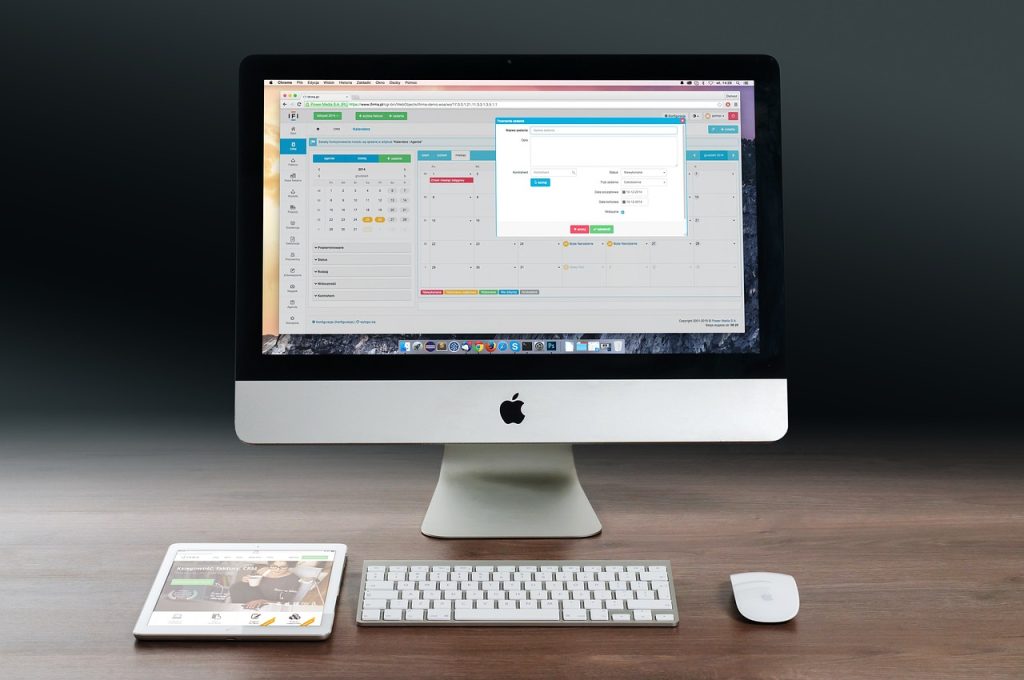
Is coding necessary to understand AI?
No, kids don’t need to know coding to understand how AI works. However, learning basic coding can give them a deeper understanding if they’re interested.
Are there risks with AI and kids?
Potential risks include privacy concerns, age-inappropriate content, or overuse. Staying involved and using parental controls can minimize these issues.
Share to Pinterest!
